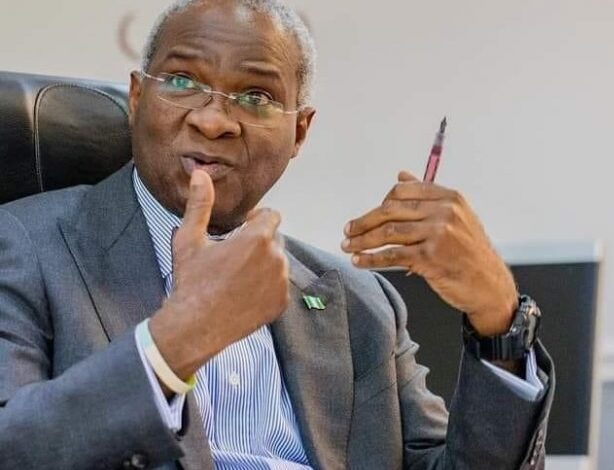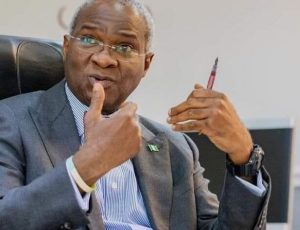
 The Minister of Works and Housing, Babatunde Fashola, has said that infrastructure development is the most legitimate way of distributing wealth in an economy.
The Minister of Works and Housing, Babatunde Fashola, has said that infrastructure development is the most legitimate way of distributing wealth in an economy.
Fashola said this on Wednesday in Abuja at the media briefing of his Ministry’s scorecard during President Muhammadu Buhari’s Administration, 2015-2023.
He explained that the impact of infrastructure on job creation and economic growth was very significant on the nation’s economy.
The event, being coordinated by the Federal Ministry of Information and Culture, and the first in the series, was presided over by the Minister of Information, Alhaji Lai Muhammed.
According to Fashola, the Change Agenda which was unfolded in the Ministry of Works and Housing in 2015 as part of the larger objective of the administration of President Muhammadu Buhari, was to grow the economy.
He the said this was being done through revamping and expansion of the nation’s infrastructure on a scale that had not been seen in a long while.
“Indeed, the Ministry of Works and Housing is present in all the states of the federation either through a road, bridge, National Housing Programme, Federal Secretariat or Special Intervention Project,” he said.
Fashola said that in the last seven and half years, the administration had been resolute in the pursuit of progressivism, which was globally recognised as the improvement of the human condition.
He pointed out that the administration had never abandoned any project of the previous administrations but rather, President Buhari gave a marching order to complete existing projects instead of starting new ones.
“In 2015 the conversation was on the existence of a large number of abandoned infrastructure and the seeming lack of political will to complete those infrastructure in spite of the availability of resources.
“Today the Buhari administration has made these possible in spite of lean resources.
“Abuja-Kaduna-Zaria-Kano Expressway were either totally non-existent or in a deteriorated state and today, the Buhari administration has demonstrated that needed political will to break the jinx on our nation’s historically most difficult projects.
“Does it not stand to reason to conclude that the party, which formed the government deserves to continue to deliver to the people of Nigeria these life-defining infrastructure.”
Fashola said that the second Niger Bridge was now completed and would soon be opened to the public for use, pointing out that what was delaying the commissioning was the construction of the link road to the bridge from both the Asaba and Onisha axis.
“I can confirm that the second Niger Bridge itself is finished. People can walk through it now. What remains now is the link roads,” he said.
On Housing, the minister said that the National Housing Programme that was initiated by the Ministry of Works and Housing at the onset of the Muhammadu Buhari-led administration had affordability and accessibility as key considerations.
“The National Housing Programme is now delivering on its objective of stimulating the economies of the 35 states and the FCT.
“Jobs have been created in the communities where the construction of the houses are being built.
“Such needs for artisans, builders, engineers, and other skilled persons in the building industry, the construction sites have been and remain centres of supply for building materials and other commodities,” Fashola said.
He explained that with the programme now in a season of completion, many of the houses had been completed and now being handed over to the beneficiaries who followed the allocation procedure set out in the National Housing Programme web portal(nhp.worksandhousing.gov.ng)
“The National Housing Programme has therefore produced new home owners but in the process, also produced citizens who found economic fulfilment as contractors, suppliers of various construction items and artisans,” he said.






















